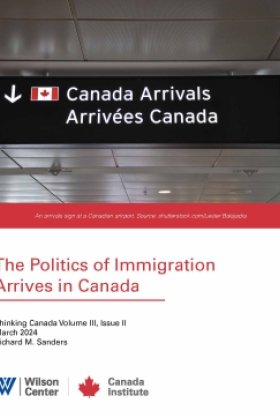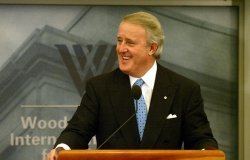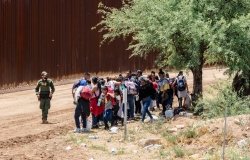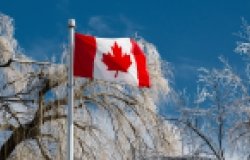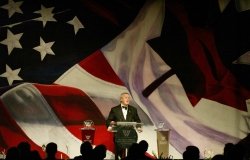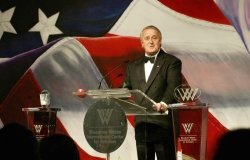Seminar - New Work on the New Deal
Overview
Authors Michael Janeway, The Fall of the House of Roosevelt: Brokers of Ideas and Power from FDR to LBJ, and David McKean, Tommy the Cork: Washington's Ultimate Insider from Roosevelt to Reagan; commentators David Ginsburg, former general counsel, Office of Price Administration (1940-1943); Harry C. McPherson, Jr., former special counsel to President Lyndon B. Johnson.
The New Deal, like so many periods of intense change and innovative public policy development, involved the hard work, dedication, and vision of a great many talented, charismatic and ultimately fallible people. The two authors who presented their work at a roundtable hosted by the Division of United States Studies, and the two commentators at the event, provided first-hand insights into the New Deal period as well as remembrances of key players such as Franklin Roosevelt himself, Tommy Corcoran, Benjamin Cohen, Eliot Janeway, Abe Fortas, and Roosevelt protégé Lyndon Johnson.
According to David McKean, Tommy Corcoran was the preeminent lobbyist of the New Deal. A regular whose picture appeared on the cover of both Time and U.S. News and World Report, his power and influence were visible and invisible, direct and indirect. Felix Frankfurter, then the Harvard Law School professor who chose so many of the bright young men of the New Deal, sent Corcoran to Washington to clerk for Oliver Wendell Holmes. After his clerkship, Corcoran moved on to the administration and worked to translate the notion of pragmatic government policy into action, helping to draft the Securities and Exchange Act of 1932 and the Public Utilities Holding Act of 1935 that sought to reorganize American financial markets in the service of accountability and the public good. A superb organizer of people, Corcoran excelled in placing talented young lawyers in government positions without regard for their political affiliations, provided that they were the best and the brightest. Throughout his career in government and his subsequent decades as a premier Washington lobbyist, Corcoran viewed people, and most notably his connections to them and the networks among them, as his ticket to power, influence, and a front-row seat for whatever was "happening" in Washington.
To Michael Janeway, part of the fascination of the New Deal lies in its creation of the institution of the brain trust, which informed the policy decisions of the Roosevelt administration. The brain trusters, Janeway said, constituted a brotherhood of ideas and power, and they expected to use it to counter what they saw as an imperial capitalistic system symbolized by the House of Morgan. Many key brain trust members were lawyers who had clerked for and been mentored by Justices Holmes, Louis Dembitz Brandeis, and Benjamin Cardozo. They were the intellectual heirs of the pre-New Deal and early New Deal dissenters and ultimately succeeded in rewriting the laws to reflect their beliefs. They set about revolutionizing the American national purpose, bringing infrastructure to the South and West and uniting the country under the banner of modernization.
With Roosevelt's death in 1945, Janeway told the audience, the New Deal brain trust became something of a government-in-exile, unwilling to show Harry Truman the loyalty they had for FDR and determined to support the political aspirations of William O. Douglas, Roosevelt's chosen successor. When Truman offered Douglas the vice presidential spot on his ticket, however, the brain trust cautioned him against taking "second place to second best," and Douglas turned down the offer. With Truman's subsequent election, the former brain trusters were banished to the sidelines (Truman distrusted them so thoroughly that he had Corcoran's phone tapped)—at least until the election of Lyndon Johnson to the presidency. According to McKean, when Tommy Corcoran learned of Johnson's election he told his friends that it was time for him to "cash in." Hopes ran high that Johnson's Great Society might finish the work of the New Deal, bringing progressivism into the modern era and the old New Dealers back into governmental power.
Harry McPherson and David Ginsburg reminisced about the potential they felt when Johnson was elected and the high hopes they maintained throughout his administration for the good they could do for the country. It was a heady time, McPherson told the audience, as LBJ began to address large-scale social injustices. The great potential for change, of course, was lost along with the war in Vietnam. Both Ginsburg and McPherson, however, stressed that they were clear from the beginning that the Great Society could never rise to the level of the New Deal. The players simply lacked the charisma and the panache of the New Dealers, even as they took on the work the New Deal had left undone.
The panelists described the sometimes troubling relationship between presidential administrations and two groups of not-so-outsiders: lobbyists and the media. Janeway depicted the press as acting on occasion as an arm of the New Deal; David Ginsburg described the anticipation with which members of the Roosevelt White House would wait for Eliot Janeway's stories, eager to see how their work would be covered by a reporter they considered to be "one of their own." The young men who had created so much of the New Deal left government to become lobbyists of the very government agencies they had brought into existence. To some extent, they may have come to confuse their power to help create the law with the right to flout the law: Corcoran ultimately was investigated by Congress and by the FBI, and the question of the proper relationship between government officials and lobbyists in the American political system remains unresolved to this day.
Drafted by Ann Chernicoff
Philippa Strum, Director of U.S. Studies (202) 691-4129
Documents & Downloads
Thank you for your interest in this event. Please send any feedback or questions to our Events staff.


